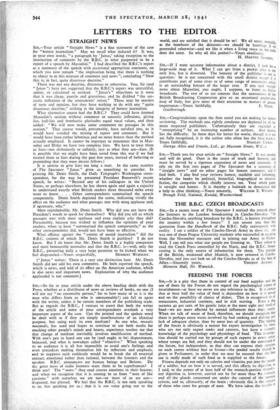Sut,—So far as your article under the above heading deals
with the Press, whether as a distributor of news or reviews of books, no one (I will not say "no reasonable person," for to how many of us it is the man who differs from us who is unreasonable!) can fail to agree with the writer, unless it be certain members of the publishing trade. But as regards the B.B.C., I venture to assert that both the writer of the article and some of your correspondents overlook a very important aspect of the case. Can the printed and the spoken word be dealt with as if they are simply manifestations of an identical purpose, but using each its own medium? As one who, maxis mutandis, has used and hopes to continue to use both media for reaching other people's minds and hearts, experience teaches me that that change of medium inevitably involves modification of method. With one's pen in hand one can be (and ought to be) dispassionate, balanced, and what is nowadays called "objective." When speaking to an audience it is all but impossible to avoid one's feelings and even prejudices making themselves felt by inflection and emphasis, and to suppress such ruthlessly would be to break the all essential contact, emotional rather than rational, between the listeners and_the speaker. B.B.C. announcers are human beings and Britons. Do the great mass of radio listeners want them to be superhuman? I think not! The " news" they read creates emotions in their hearers, arid when we recognise that it is coming to us from "men of like passions " with ourselves we are not—or most of us are not— disgusted, but pleased. We feel that the B.B.C. is not only speaking to us, but speaking for us ; that it is our voice going out to the world, and are satisfied that it should be so! We all sneer, mentally, at the bombasts of the dictators—we should be humbugs if we pretended otherwise—and we like it when a living voice on the radio does the same. So why all this pother?—Yours obediently,
H. MARTIN SAtmEn.s.






























 Previous page
Previous page